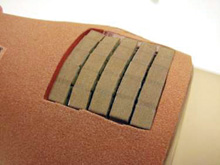The Sensors, Energy, and Automation Laboratory of the University of Washington (UW), Seattle, in collaboration with the U.S. Department of Veterans Affairs (VA), has completed the development of a prototype Fringing Field Sensor Array (FFSA)-a collection of high-resolution pressure sensors that can be incorporated into the lining of artificial limbs, accurately and noninvasively measuring sheer stress, pressure, and other characteristics at the limb-prosthesis interface.

The FFSA pixels fit seamlessly under the prosthetic liner, measuring all aspects of the prosthesis’ use. Photograph courtesy of Alexander Mamishev, PhD, and the Sensors, Energy, and Automation Laboratory, University of Washington.
The FFSA is an improved version of the previously developed Fringing Field Plantar Array, according to Kishore Sundara-Rahan, sensor engineer and doctoral candidate at the UW Department of Engineering, who is working on the project under the direction of Alexander Mamishev, PhD.
The sensitivity and sheer range of data that the FFSA can provide will allow physicians and researchers to design prosthetic limbs specifically tailored for individual patients’ residual-limb surfaces. In addition, the FFSA can be used in diagnostic devices to measure contact patterns and reveal strain and stress information, enabling the design of prostheses that are “more comfortable and natural,” Sundara-Rahan said.
Several companies have expressed interest in adopting the FFSA for both prosthesis fitting and diagnostic measurements.




